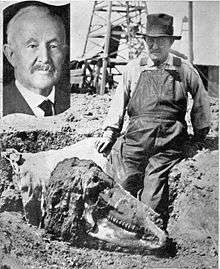Charles Hazelius Sternberg
| Charles Hazelius Sternberg | |
|---|---|
 | |
| Born | 1850 |
| Died | 1943 |
| Nationality | USA |
| Fields | Paleontology |
Charles Hazelius Sternberg (June 15, 1850 – July 20, 1943), was an American fossil collector and amateur paleontologist.
Biography
Sternberg's older brother, Dr. George M. Sternberg (1838–1915) was a military surgeon assigned to Fort Harker near Ellsworth, Kansas, and brought the rest of the Sternberg family to Kansas to live on his ranch about 1868. Once there, Charles became interested in collecting fossil leaves from the Dakota Sandstone Formation. In the 1870s, he studied at Kansas State under the noted paleontologist Benjamin Franklin Mudge, but he soon left school in order to spend more time in the field.
During the early years of the Bone Wars, Charles Sternberg collected fossils in Kansas for Edward Drinker Cope. He wrote two books: The Life of a Fossil Hunter (1909) and Hunting Dinosaurs in the Badlands of the Red Deer River, Alberta, Canada (1917).
Charles married Anna Musgrave Reynolds on 7 July 1890. One son died in toddlerhood, and their only daughter died at age 20 in 1911.[1] Three sons survived into adulthood, George F. Sternberg (1883–1969), Charles Mortram Sternberg (1885–1981) and Levi Sternberg (1894–1976), who also had careers in vertebrate paleontology. They became famous for their collecting abilities and many discoveries, including the "Trachodon mummy", an exquisitely preserved specimen of Edmontosaurus annectens (see hadrosaurid). Son George was also a noted fossil hunter famous for finding the iconic "fish within a fish" — a 13-foot (4.0 m) Xiphactinus which had inside it a nicely preserved, 6-foot (1.8 m) Gillicus arcuatus.
Sternberg was a deeply religious man. He wrote devotional poetry and published a collection of poems called The Story of the Past: Or, the Romance of Science. In his old age, he would visit the American Museum of Natural History to view his finds, and one visit to the "Trachodon mummy" inspired the following quote:
| “ | My own body will crumble in dust, my soul return to the God who gave it, but the works of His hands, those animals of other days, will give joy and pleasure to generations yet unborn. | ” | |
| — Charles H. Sternberg[2] | |||
Sternberg Museum
Fossils collected by Charles Sternberg, including dinosaurs from the western United States and Canada, are in museums around the world. Many of the fossils discovered by Charles Sternberg's son, George F. Sternberg, are on display in the Sternberg Museum of Natural History in Hays, Kansas.
In popular culture
In the 1994 novel End of an Era by Robert J. Sawyer, the Canadian protagonists' time machine is named His Majesty's Canadian Timeship Charles Hazelius Sternberg, because of the two scientists journeying back to the Cretaceous era, one is a paleontologist. The narrator comments that "our timeship is almost universally known as the Sternberger, because to most people it looks like a fat hamburger."[3]
The 2007 novel The Bone Sharps by Tim Bowling centres about the fossil-hunting work of Charles Sternberg in Kansas, in 1876 and 1916. Secondary characters are Sternberg's young assistant, Scott, who served in the trenches of World War I; another bone hunter, Scott's fiancee (1916) and possibly widow (1975), Lily; and Charles Sternberg's deceased daughter, Maud; as well as Edward Drinker Cope and Cope's wife Annie.[4]
Bibliography
Books:
- The Story of the Past: or, The Romance of Science (1911). Sherman, French & Company, Boston.[5]
References
- ↑ Everhart, Mike (2004-10-13). "Charles H. Sternberg: Fossil Hunter". Oceans of Kansas. Retrieved 2013-03-29.
- ↑ Dinosaurs in the Attic - An Excursion into the American Museum of Natural History, Douglas J. Preston, St Martin's Press, New York, 1986
- ↑ Sawyer, Robert J. (1994). End of an Era. New York: TOR. p. 21. ISBN 0-312-87693-9.
- ↑ Bowling, Tim (2007). The Bone Sharps. Kentville, Nova Scotia: Gaspereau Press Limited. ISBN 978-1-55447-035-8.
- ↑ Rogers, Ed (2013). "Rare Paleontology Book, Charles H. Sternberg; A Story of the Past". Ed Rogers Rare and Out of Print Geology Books. Ed Rogers Geology Books. Retrieved 2013-03-29.
External links
| Wikimedia Commons has media related to Charles H. Sternberg. |
- Works by or about Charles Hazelius Sternberg at Internet Archive
- Class materials on the Sternbergs from a History of Geology course at Emporia State University.
- Sternberg Museum of Natural History in Hays, Kansas
- Trip to Hays, Sternberg Museum
- Charles H. Sternberg - Oceans of Kansas Paleontology
- Dinosaurs in the Deep
- The Story of the Past - collection of poems written by Sternberg